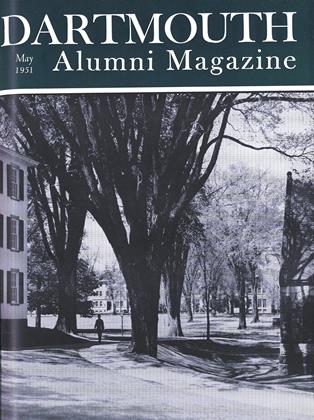FROM the University of California at Berkeley, where he is now Professor of U. S. History, Carl Bridenbaugh writes that while his fellow '25ers were frolicking at reunion he was at the University of Minnesota "beating the drum for colonial history," and to his great regret could not be with us.
During these 25 years past, Carl has distinguished himself in the world of letters, having written or edited eight books on the subject of American History. He started modestly, as a teacher in secondary school in Penn- sylvania, but after two years stepped up to a job as instructor of English and History at M.I.T. "trying to fill the capable shoes of Schuyler Foster '25 (Phi Bete)." While in Cambridge he studied at Harvard and managed to acquire, in his spare time, both a Ph.D. and, in 1931, a helpmate, his wife Jessica, who shared his interests and collaborated with him on one of his books, Rebels & Gentlemen:Philadelphia in the Age of Franklin, published in 1942. Unfortunately, this happy way of life was brought to an end by the untimely death of Jessica, but she did have the pleasure of seeing their book published.
After teaching at Tech for ten years, with a promotion to Assistant Professor, Carl was asked to Brown University in 1938 as an Associate Professor. Carl, who should know a first-class institution of learning, speaks glowingly of Brown. But in 1942 the Navy called him to Cornell, with the rank of Lieutenant, USNR. He went from Cornell to Fort Schuyler, then to Washington, where he says he really learned the power of concentration when he wrote the History of the Eighth Fleet "with three other typewriters going full speed ahead." Later he was given a spell of sea duty, chasing submarines with a yacht.
With the termination of the war came an interesting opportunity for Carl, in delightful surroundings—it was to set up an institute of Early American History at Williamsburg, Virginia, under the joint sponsorship of the College of William and Mary and Colonial Williamsburg, Inc. This has been Carl's interest and occupation during the past five years. Here his collateral ambitions have been to "convert the William & Mary Quarterly from a provincial Virginia journal into a magazine of national scope and importance, to conduct post-graduate training in my field, to do some writing to reawaken interest in an era of our history, 1607-1815, which has been sadly neglected." During this period Carl has written three books and edited one. For the benefit of some of the gals who enjoy reading Dartmouthiana to their husbands of an evening, I am going to list: Peter Harrison:First American Architect (1949), The ColonialCraftsman (1950), Seat of Empire (on the political role of Williamsburg), and Gentleman'sProgress: the Itinerarium of Dr. AlexanderHamilton (1948), described as a racy 18th Century travel book.
Carl mentions the names of four teachers at Dartmouth who gave him the inspiration to go on educating himself. They are Herbert Darling Foster, William K. Stewart, Fred Parker Emery, and Charles R. Lingley.
Somewhere along the way, Carl doesn't say where specifically, he has acquired a lifepartner, Roberta. They share the Dartmouth man's dream of retiring, some day, to live near Hanover and spend their mellow years browsing in the Baker Library.
CARL BRIDENBAUGH '25
 View Full Issue
View Full Issue
More From This Issue
-
 Article
ArticleDeaths
May 1951 -
 Article
ArticleBlueprinor Survival
May 1951 By WILLIAM STUART MESSER -
 Article
ArticleHe Values the Rare In Books and Life
May 1951 By JOHN HURD '21 -
 Class Notes
Class Notes1918
May 1951 By ERNEST H. EARLEY, DONALD L. BARR, RICHARD A. HOLTON -
 Article
Article1949
May 1951 By ROBERT H. ZEISER, DAVID S. VOGELS JR., JOHN F. STOCKWELL -
 Class Notes
Class Notes1905
May 1951 By GEORGE W. PUTNAM, GILBERT H. FALL, FLETCHER A. HATCH








